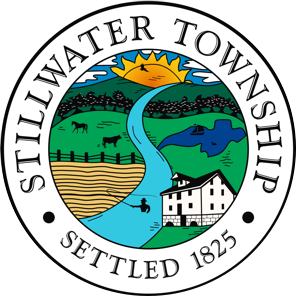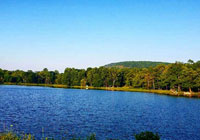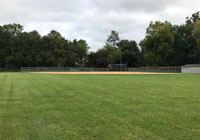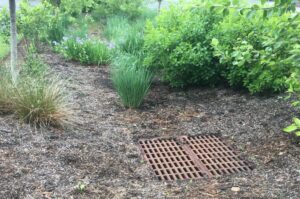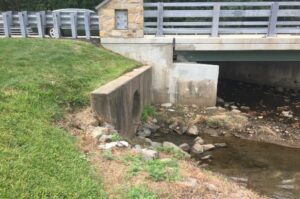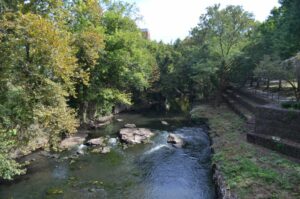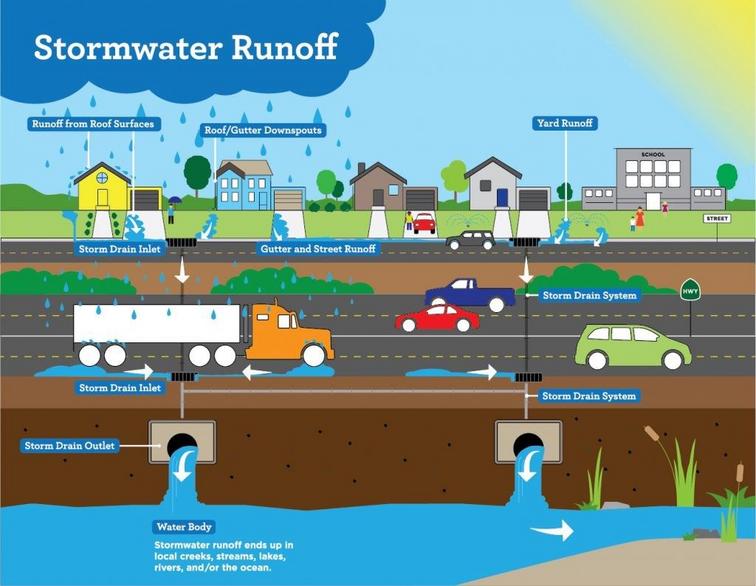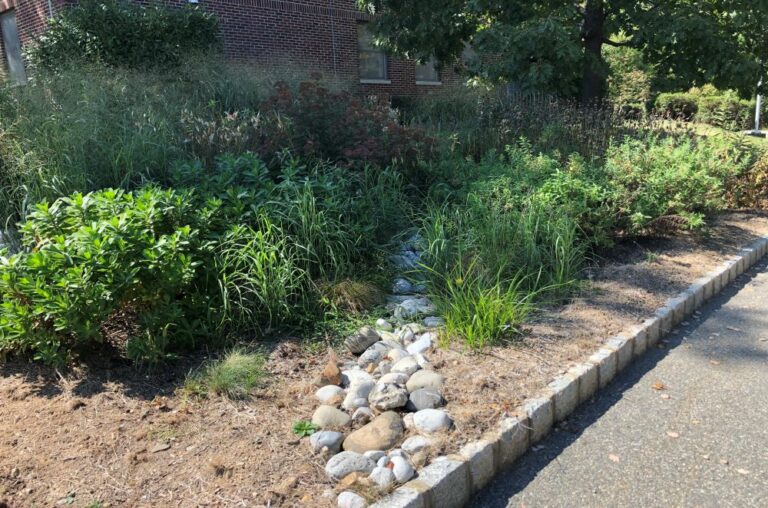Stormwater Management
What is Stormwater?
On January 5, 2004, the New Jersey Department of Environmental Protection adopted significant changes to the rules governing stormwater management in New Jersey. These new rules created the Municipal Stormwater Regulation Program, which requires municipalities to apply for and obtain a permit for stormwater discharges from their municipal separate storm sewer systems, or MS4s to surface water bodies like the Passaic River and its tributaries. Under the terms of the permit, every municipality in New Jersey was required to develop a plan to implement various strategies to reduce the amount of pollutants entering our storm sewer (drainage) systems.
Background
When it rains and when snow melts, some of the stormwater is absorbed into the ground as it flows over lawns and other open space. This process is known as groundwater infiltration. Stormwater also flows over roofs, streets and parking lots into a collection system of inlets, culverts and streams and ultimately the Passaic River and Newark Bay. Along the way, this “runoff” picks up contaminants such as fertilizers, soil and other sediment, pet waste, and vehicle wash-off, such as oil and toxic metals; all of which end up in the waters that we use for drinking, swimming, fishing, etc.
Stormwater runoff has been identified as the leading threat to the water quality in New Jersey. As development continues to increase, more contaminants find their way into our waterways, potentially impacting the quality of our drinking water. The NJDEP Municipal Stormwater Management Rules mandate towns to develop plans and implement certain pollution prevention measures to reduce the amount of pollutants entering our waterways.
What is Stillwater Township Doing?
In accordance with N.J.A.C. 7:14A-25 (Municipal Stormwater Regulations), Stillwater Township will be preparing a Municipal Stormwater Management Plan, which documents the strategies the Township will implement to address stormwater-related impacts of new development. The plan addresses groundwater recharge, stormwater quantity and quality; including design and performance standards for new “major development” (projects that disturb one or more acre of land). These strategies are intended to minimize the adverse impact of stormwater runoff on water quality and the loss of groundwater recharge that provides base flow in receiving water bodies.
Stillwater Township will also develop a Stormwater Pollution Prevention Plan, which outlines the methods the Township will employ to reduce surface water pollution from its municipal storm sewer system.
Stillwater Township Ordinances
What Can You Do?
Your everyday activities can affect water quality. Help reduce the amount of pollution that flows into our waterways by following the tips below.
- Shop for nonhazardous, biodegradable, and phosphorous-free household cleaning products.
- Rinse paintbrushes in the sink if you use water-based paints. With oil-based paints, use paint thinner to clean brushes and dispose of thinner through a local household hazardous waste program.
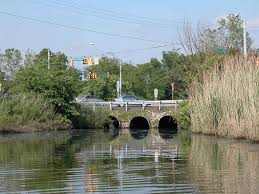 See a list of local household hazardous waste facilities.
See a list of local household hazardous waste facilities. - Sweep up dirt and debris and discard them on your lawn or in the trash. Hosing off pavement washes pollutants into storm drains, which may lead to local creeks, bays, and the ocean.
- Take your car to a car wash instead of washing your car in your driveway, on the street, or in your yard. This not only conserves water but also eliminates the running off of harmful pollutants.
- Keep trash cans closed to prevent the trash from scattering.
- Store hazardous substances such as paints, solvents, and cleaners, and use them sparingly, according to the directions. Store properly to avoid spills.
- Dispose of drywall and hardened concrete, and mortar in the trash or visit a list of recycling centers.
- Do not rinse concrete or mortar from a bucket or wheelbarrow into the street; dilute the mixture with water and rinse it into an area with vegetation or gravel.
- Participate in local recycling programs. To find out more about recycling in your area.
- Dispose of unwanted chemicals at a household hazardous waste collection center in your area. Never pour hazardous materials into the street, sewer, or storm drain. For more information on hazardous waste see a list of local household hazardous waste facilities.
- Sweep up dirt and debris and discard them on your lawn or in th
- Eliminate or, at least, reduce the use of soaps and shampoos when using outdoor showers that drain to the street.
Litter & Recycling Tips
- Reduce, reuse, and recycle materials whenever possible to create less waste, which could end up on our streets and contribute to stormwater pollution.
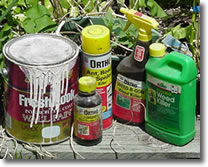
- Pick up trash and litter on your property and put them in the trash. Always use a public trash can for trash in public areas.
- Recycle any reusable materials, especially cans, bottles, and paper.
- NEVER throw litter and debris directly into storm drains. Such debris can wash into waterways and onto beaches, and clogged drains can cause street flooding and traffic congestion.
- Always put your cigarette butts in ashtrays or solid garbage cans, not on beaches are not ashtrays. When an ashtray or garbage can is not available, store extinguished butts in your cigarette pack until you find a proper receptacle.
- Empty automobile ashtrays into the trash, not out your car window or directly on the ground. Proper disposal will help keep our waterways clean and minimize the risk of fires.
Your everyday activities can affect water quality. Help reduce the amount of pollution that flows into our waterways by following the tips below.
- Conserve water. Do not over water your lawn. Adjust sprinklers if water runs into the gutter. Water during cooler times of the day.
- Identify pests before spraying pesticides. Ask a specialist at your garden center for advice on how to treat for that specific pest. Use integrated pest management (IPM) methods to minimize chemical use in your garden. Many IPM methods do not even require the use of chemical pesticides.
- Reduce the amount of grass by planting ground cover. This reduces the need for fertilizers, herbicides and pesticides.
- Use natural pesticides such as milky spore and nematodes wherever possible. If you must use chemical pesticides, use them sparingly and in targeted areas.
- Have your lawn tested at the county Rutgers Cooperative Research and Extension office to determine if you need to fertilize. If so, use natural and slow-release nitrogen fertilizers and make sure to follow the manufacturer’s directions. Never apply to your lawn or garden if the weather calls for rain.
- Use a mulching mower instead of bagging grass clippings to reduce lawn wastes and to reduce the need for fertilizer. Do not put loose leaves or grass clippings in the street. Use them in a compost pile as a source for enriched soil. If you do need to dispose of leaves or grass clippings, contact your municipality to determine the appropriate method to dispose these wastes.
- If you must use herbicides, apply them directly to the weeds rather than broadcasting if possible. A healthy lawn will reduce weed growth.
- Use mulch on flower beds and gardens to prevent weeds from growing and to help absorb water.
- Use drought-resistant native plants in gardens and beds. These plants require less fertilizer and less water, thereby reducing the amount of potential polluted runoff.
Create a Rain Garden on your property:
A rain garden for your home is designed to capture the runoff from your roof, driveway and property. This will help maintain groundwater levels and reduce runoff. The garden should be constructed in a low area of the yard. It is bowl-shaped, rather than bermed, and planted with native plant species. There is much information available on the internet, including planting plans. For more information, start with the Rutgers NJ Agriculture Extension Station or the Native Plant Society of New Jersey. Other links that can help with a more environmentally friend garden
With Your Pets
Your everyday activities can affect water quality. Help reduce the amount of pollution that flows into our waterways by following the tips below.
- Pick up after your pet. Properly dispose of pet waste into the
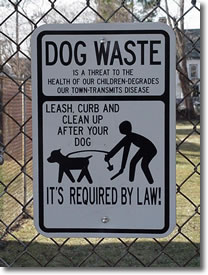 trash or toilet. Animal waste contains coliform bacteria, which is harmful to our health and, when washed into swimming waters, can result in beach closings.
trash or toilet. Animal waste contains coliform bacteria, which is harmful to our health and, when washed into swimming waters, can result in beach closings. - Carry a newspaper or plastic bag to pick up the waste when you walk your pet. Nuisance laws prohibit you from allowing your pet’s waste to remain on private or public land.
- When treating your pet and yard for fleas or ticks, check with your veterinarian for safe substitutes. Never dispose of flea dip liquid on the ground or in the storm drain. It should be disposed of as a household hazardous waste. Visit https://njhazwaste.com/counties for a list of county household hazardous waste disposal centers.
- Do not feed wildlife such as geese, pigeons, ducks and deer. Feeding results in more pollution from their wastes.
With Your Vehicles
Your everyday activities can affect water quality. Help reduce the amount of pollution that flows into our waterways by following the tips below.
- Take your car to a service center to change oil or antifreeze. If
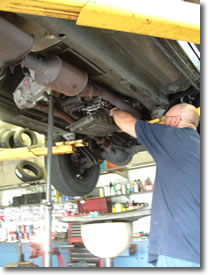 you do change your own oil or antifreeze, do it in a garage, never on the street. Use a self-contained oil pan and discard the oil at a local service center for recycling. NEVER discard oil, gas or antifreeze into a stormwater drain. Antifreeze should be discarded at a household hazardous waste facility. Visit https://njhazwaste.com/counties/ for a list of local household hazardous waste facilities.
you do change your own oil or antifreeze, do it in a garage, never on the street. Use a self-contained oil pan and discard the oil at a local service center for recycling. NEVER discard oil, gas or antifreeze into a stormwater drain. Antifreeze should be discarded at a household hazardous waste facility. Visit https://njhazwaste.com/counties/ for a list of local household hazardous waste facilities. - If you spill hazardous fluids, contain it immediately with rags or cat litter. Clean up the spill and properly dispose of the waste.
- Check your car for leaks and schedule regular tune-ups. If you find leaks or drips, have your car repaired.
- Store hazardous materials properly to prevent spills. Store them in the original closed container.
For more information:
Visit the websites below:
- Rutgers – New Jersey Agricultural Experiment Station
- Rain Garden information
- NJ Green Infrastructure
- Clean Water NJ
- NJ Stormwater
- Frequently Asked Questions
Visit www.cleanwaternj.org and www.njstormwater.org for additional information as well as educational resources. Click here for a map of the NJ Watersheds, Watershed Management Areas and Water Regions.
Visit the Office of Emergency Management page for links and the latest information
